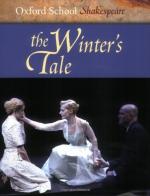|
This section contains 5,575 words (approx. 19 pages at 300 words per page) |

|
SOURCE: Curtright, Travis. “Reconsidering the Tragic Aspects of Leontes: Death and Laughter in The Winter's Tale.” English Language Notes 40, no. 1 (September 2002): 43-57.
In the following essay, Curtright challenges the critical position that Leontes displays characteristics of a tragic hero, arguing instead that Shakespeare envisioned him as a melodramatic villain who would evoke laughter from a Jacobean audience.
If Hamlet is Shakespeare's most enigmatic depiction of a tragic character's confused motivations, then Leontes might be his comedic counterpart. As audiences are mystified why Hamlet does not act, they are equally perplexed why Leontes does. Like Mona Lisa's smile, Leontes's sudden jealousy, murder attempt, and rage invite speculation, which on reflection seems inadequate; such is the history of criticism on Leontes as well. Some commentators attempt to pinpoint the moment of his jealousy with the hope of explaining it in terms of early modern ideas of melancholy1 or, more recently...
|
This section contains 5,575 words (approx. 19 pages at 300 words per page) |

|


